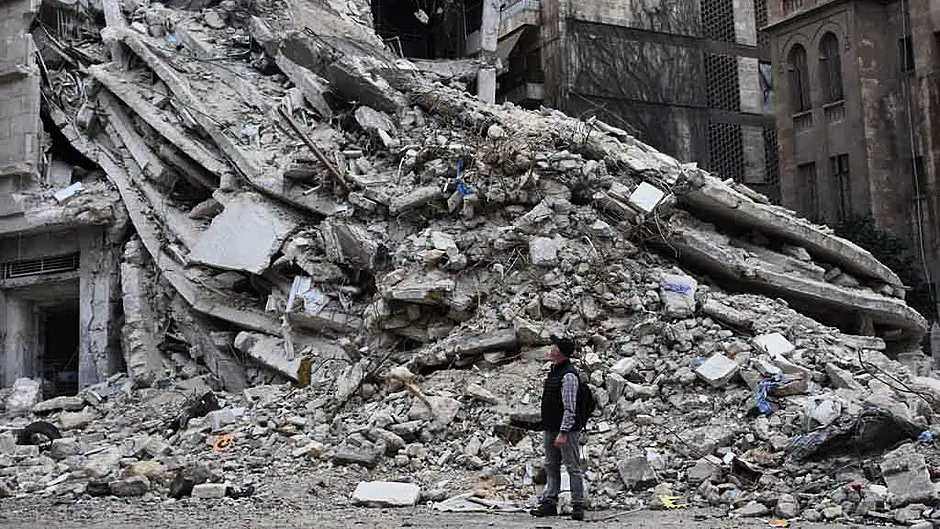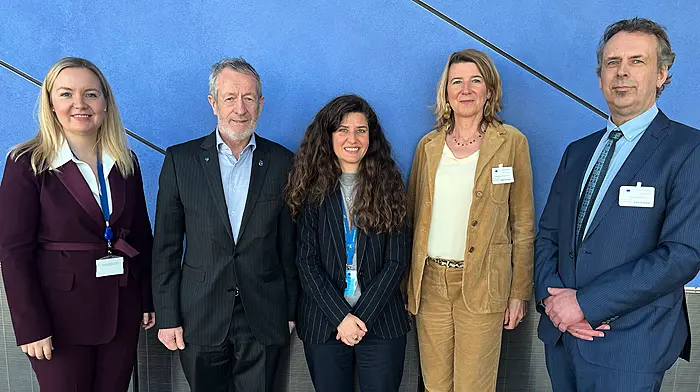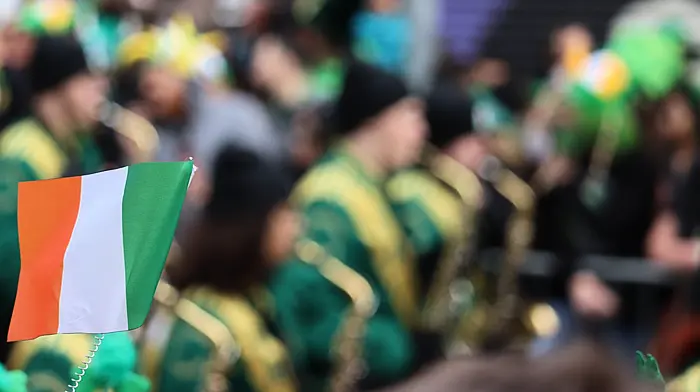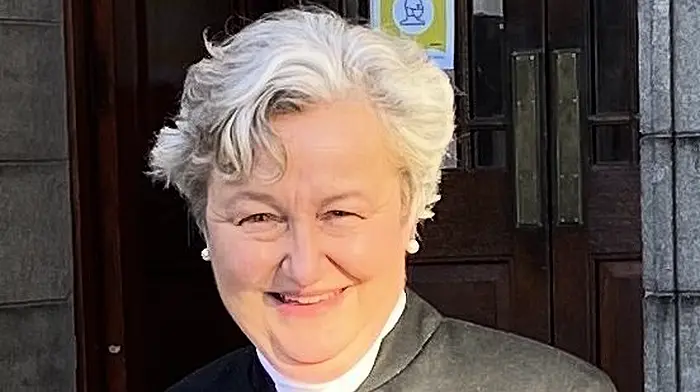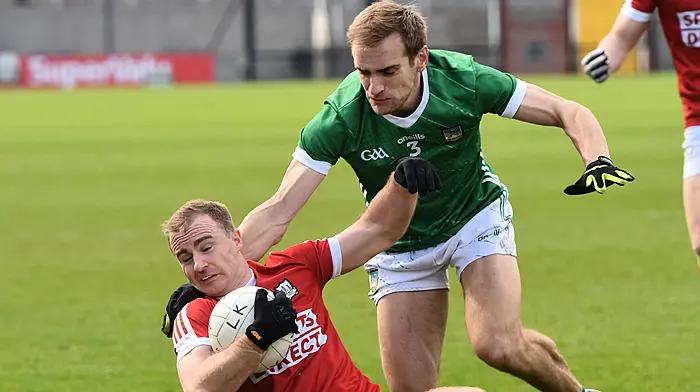Fr Tony O’Riordan has dedicated his life to others, both at home and in some of the world’s most challenging locations. On a recent visit back to his native West Cork from Syria, he said that people’s ongoing support was making a world of difference.
A WEST Cork Jesuit priest is working to help victims of the Syrian earthquake to rebuild their lives.
Fr Tony O’Riordan from Kilmichael said that the devastating quakes on February 6th had opened up not only physical cracks, but also the traumas of a country battered by civil war for the past 13 years.
He’s based in Aleppo, a city where four million children, women and men were already relying on humanitarian aid.
‘People had already lost loved ones, lost their homes, saw their families scattered around the world and were living in crippling poverty, so we’re working to help them deal with a whole load of compound traumas,’ he said.
Fr Tony (52) has dedicated his life to helping others.
He studied law and politics before joining the Jesuits nearly 30 years ago, starting his journey in Ballymun, where he was a board member of the Ballymun Regeneration Company, and worked closely with social justice campaigner Fr Peter McVerry. He was instrumental in establishing the Peter McVerry Trust and was its first chairperson. Subsequently, he served as a parish priest in Myross, Limerick for six years, during which time he dealt on a daily basis with the damage caused by poverty, drugs and crime.
In 2018, he was sent to Maban, south Sudan to lead the Jesuit Refugee Service (JRS) response in one of the world’s most isolated refugee camps, a sprawling tent village for 150,000 refugees.
While in Maban, Fr Tony opened a teacher training college for refugee youth and youth in the local host community. He also set up a school, was a driving force in opening the region’s only library and was involved in providing care to women who were victims of gender-based violence.
‘It was really, really tough,’ he remembers. ‘It’s one of the most underdeveloped spots of east Africa, there are no brick buildings, huge levels of food insecurity, because of its location, there’s no road network, so access to supplies in the rainy season, was always precarious.
‘And then south Sudan was in the midst of a civil war, so there were flare-ups of violence on a regular basis.’
Among the memories of hardship and loss, he recalls brighter memories of being called upon to drive women to hospital to give birth.
‘If it was a boy they’d insist on calling him Tony. If it was a girl they’d want to know my wife’s name and I’d have to explain I didn’t have such. They’d settle for calling it after my mother, so there’s lots of baby Peggys out there!’ he said.
He wasn’t long back home in West Cork, when a request came for someone to go to Syria to head the Jesuit response to the millions of people displaced by the protracted civil war there, and he answered that call in September ‘21.
‘I came in at a stage where the war was smouldering; sort of at a stage where it could take off again, or extinguish,’ he said.
JRS is mainly involved in improving access to healthcare through its 11 primary healthcare clinics.
‘The education infrastructure is also severely battered, a third of schools were destroyed, and alongside that many parents are forced to have their children out working to bring in income to survive. We run non-formal, flexible education to provide a safe space, and some opportunity for them to be children,’ said Fr Tony.
JRS is also very involved in building cohesion among the various groups, regardless of backgrounds, through its community hubs.
‘They give a chance for people to realise that we’re all in this struggle together,’ he said.
When the earthquake hit, he was at home in the Jesuit apartment in Damascus, a five-hour drive from Aleppo.
‘It was 4.30am, Sunday night/Monday morning. The bed shook fairly firmly. I recognised straight away it was an earthquake. It only lasted for about a minute, but the phone started pinging straight away and it soon became clear that things were more serious elsewhere,’ he said.
He travelled to Aleppo that Tuesday and joined the JRS team there, seeing first-hand the scenes that shocked the world.
He compared it to a movie set, except for the scale of destruction, and the mountains of rubble.
‘It probably took me several weeks to realise the terror people went through. For them there was violent shaking of the entire house at 4.30am on a really cold, wet winter’s morning, hearing the walls cracking and a terrible groan from the earth. Everyone talks about screaming out for their loved ones, rushing to the beds of their children or parents, hugging them and waiting in the bed to die. Then living through those two terrifying moments, and going out to the streets, in panic, and having several more strong aftershocks, and another major quake that lunchtime,’ he said.
Months on, some ‘normality’ has resumed.
‘But the issue now is that the gap between people’s income, and what you need to buy for just the basics of life, is widening all the time. When I went first, in 2021, €1 was worth £2,500 (Syrian pounds) and this week it’s £7,500. So, imagine your income hasn’t increased but the purchasing power of your income has gone down by three quarters, prices have increased, and there is no social welfare system. It’s normal to see armies of children scrounging in bins.’
Since February, Fr Tony and his team have impacted on the lives of more than 40,000 people affected by the earthquakes.
The JRS has distributed food aid to 7,800 families, helping more than 35,000 children, women and men. These families have been provided with food baskets designed to support family meals for 25 days. On average, €1 provides food items for one person per day. In the coming weeks, Fr Tony and his team will helping an additional 4,000 vulnerable families with food aid.
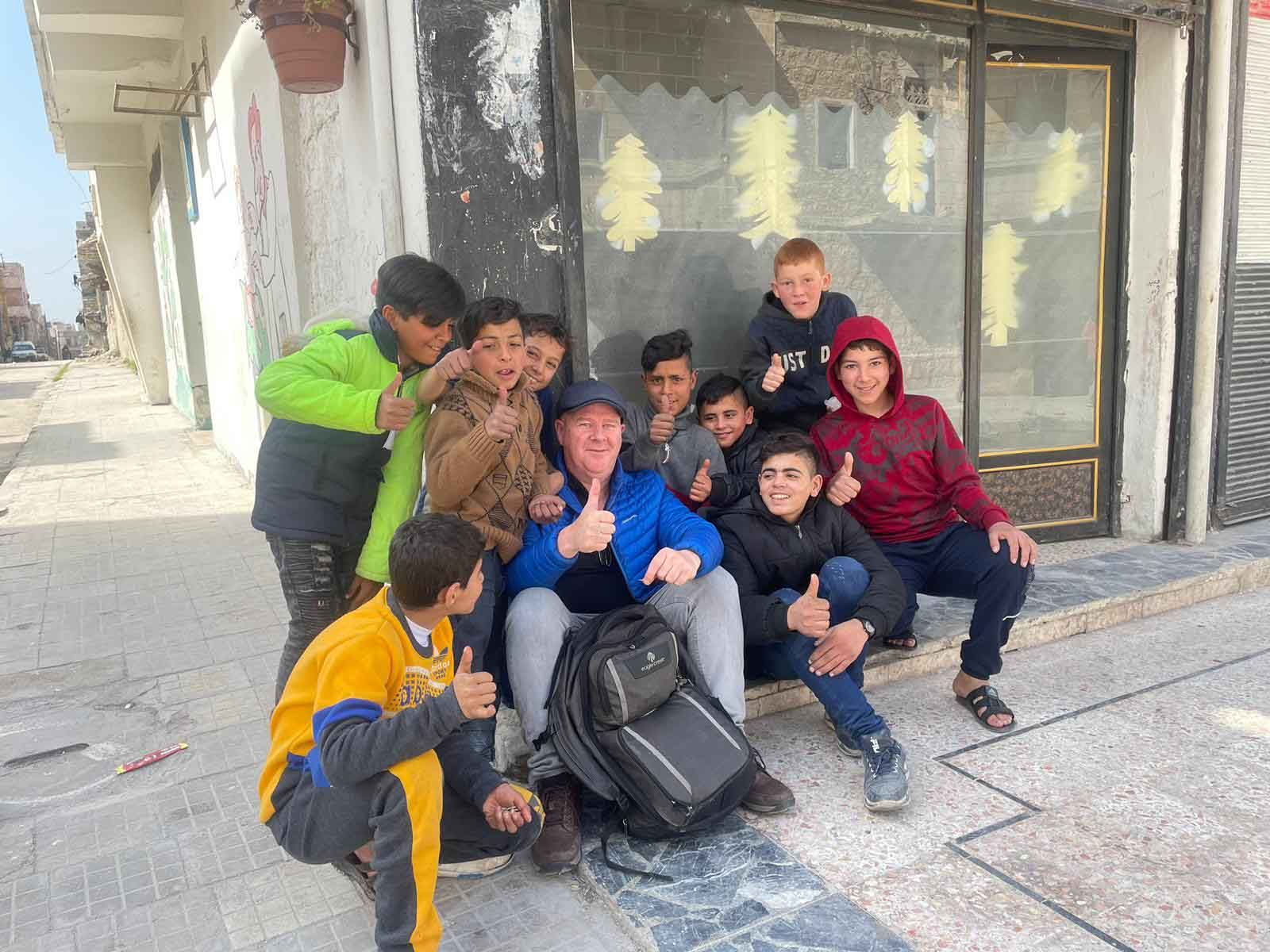 Fr Tony has been working in Syria since 2021, where he has set up non-formal, flexible education services to provide a safe space for young people.
Fr Tony has been working in Syria since 2021, where he has set up non-formal, flexible education services to provide a safe space for young people.
The JRS has also provided 2,000 children across Syria with psychological first aid. As many schools were used as emergency shelters and schooling was disrupted following the earthquakes, it has played a vital role in offering these children both an ongoing safe space and educational activities on a daily basis.
The JRS has also provided basic psychological first aid to more than 6,800 adults and it has also provided more than 5,000 people with safety information sessions on how to cope in the event of a further earthquake. A further 500 people across Syria have been supported by individual and group psycho-social sessions.
 Fr Tony and his team have distributed food aid to 7,800 families, helping more than 35,000 children, women and men since the quake.
Fr Tony and his team have distributed food aid to 7,800 families, helping more than 35,000 children, women and men since the quake.
‘People want to talk and to listen to each other,’ he said. ‘And it has been amazingly healing to do this in the early stages of the trauma, to help prevent longer term PTSD
setting in. It’s believed that 80% of people will generally recover once they get the space to acknowledge their story; while 15% will need more focused intervention.’
Fr Tony enjoyed a visit home to West Cork last week to see his siblings and, of course, his mum Peggy – and to enjoy her home cooking.
He also took the opportunity to thank his neighbours, and people throughout West Cork for their fundraisers,
especially in the aftermath of the earthquake.
Highlighting how the situations in Syria and Sudan won’t be solved in a month, he urged continued support.
‘It’s the strength of people I’m serving that keeps me going, and the support that I get
from home,’ he added.
• To donate, contact Irish Jesuits International, 20 Upper Gardiner Street, Dublin 1, tel 01-836 6509.

